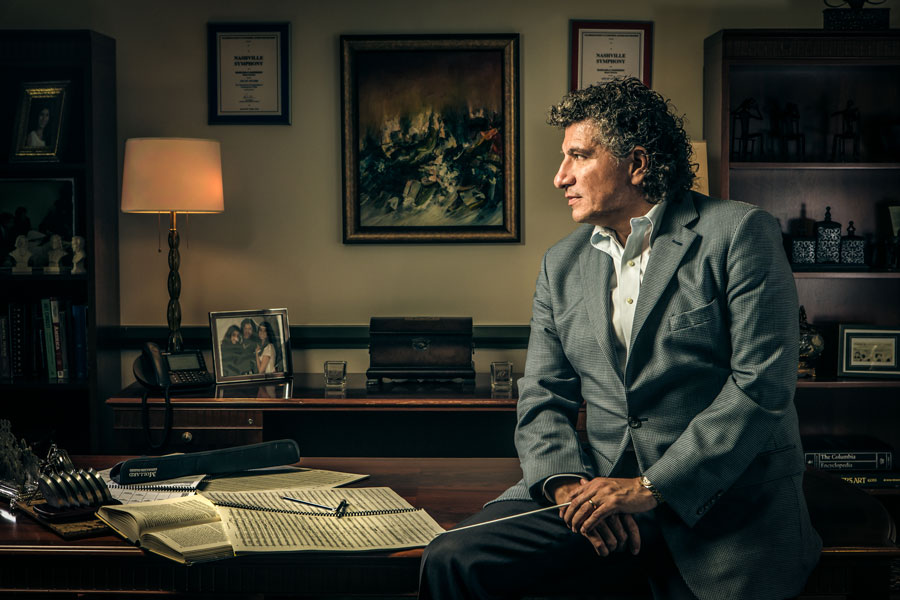Giancarlo Guerrero, a native of Costa Rica, is a five-time Grammy award-winning Music Director of the Nashville Symphony Orchestra, a post he has held since 2009 and recently committed to through the 2024-25 season. Guerrero previously held posts as the Principal Guest Conductor of The Cleveland Orchestra Miami Residency from 2011 to 2016, Music Director of the Eugene Symphony between 2002 and 2009, and Associate Conductor of the Minnesota Orchestra from 1999 to 2004. The Narodowe Forum Muzyki is extremely pleased with the appointment of Giancarlo Guerrero to the position of Artistic Director of the Wroclaw Philharmonic taking effect for the 2018-2019 season! Maestro Guerrero will spend eight weeks per season with the orchestra in addition to touring and recording activities. Welcome, Maestro!
Antonín Dvořák’s popular Carnival is the second of three concert overtures aimed at portraying impressions of what the human soul experiences, The concept has been described by biographer John Clapham as, "three aspects of the life-force's manifestations, a force which the composer designated Nature, which not only served to create and sustain life but also, in its negative phase, could destroy it." Nature, Life, and Love were Dvořák’s original titles for the set and the tryptic was originally intended to be published under the single opus number 91. Dvořák conducted the first performance on April 28, 1892, in Prague, where the works were presented together in this vein. The composer, however, had difficulty settling on titles for the individual movements and when they appeared in print they had been changed into three separate pieces: In Nature’s Realm, opus 91, composed from March 31 to July 8, 1891, Carnival, opus 92, written between July 28 and September 12, and Othello, opus 93, begun in November and completed in January of 1892. The composer proclaimed that the Carnival Overture was meant to depict "a lonely, contemplative wanderer reaching at twilight a city where a festival is in full swing. On every side is heard the clangour of instruments, mingled with shouts of joy and the unrestrained hilarity of the people giving vent to their feelings in songs and dances." In the modern repertoire, the Carnival Overture is performed far more frequently than its companion scores.
Karol Szymanowski wrote his Second Violin Concerto in 1932 and 1933. It was performed for the first time with violinist Paweł Kochański, under the baton of Grzegorz Fitelberg, at the Warsaw Philharmonic on October 6, 1933. Szymanowski’s childhood friends included the pianist Artur Rubinstein and Paweł Kochański and he often composed with them in mind. After moving to America In the early 1920s, Kochański received a letter from Szymanowski who described writing the Second Violin Concerto as, "squeezed out of me, as out of a desiccated tube of toothpaste." Departing from his earlier modernist style, Szymanowski said the work was "horribly sentimental… beating all records of sentimentality… I am almost ashamed of myself!!"
Undoubtedly the leading Polish composer between Chopin and Lutosławski, Szymanowski drew inspiration from a wide range of influences, which he later merged with his explorations of folk music from his native Poland. The Second Violin Concerto is deeply fixed in Polish folk music, especially that of the Tatra Mountains around Zakopane. The piece has been described as earthy and sinewy, with the Highland folk element playing an important role. The opening violin melody foreshadows many of the musical ideas of the concerto. Following the end of the cadenza, the second half of the piece develops into an animated march leading to a tranquil andantino. The finale insinuates the opening with the principal theme returning.
Johannes Brahms began his First Symphony during the 1850s but didn’t complete it until 1876. Few such works of music have taken so long to go from sketch to finished product, however, Brahms put off writing symphonies and string quartets, the two forms at which Beethoven had excelled. "You can't have any idea what it's like always to hear such a giant marching behind you," the composer said. As a teenager, Brahms had been championed by the likes of Robert Schumann and thus had encountered the delight of fame and the dread of high expectations early in his career, becoming a harsh self-critic. All this, despite the fact that he had successfully negotiated the ‘promising’ phase of his career and was recognized as a master and heir to the Viennese tradition. By the time he presented the premiere of the First Symphony on November 4, 1876, in Karlsruhe, Germany, he was forty-two years old. The event, which may have purposefully taken place outside the musical capitals of Vienna and Berlin was an utter success. Responses to the piece ranged from venerable approval to absolute elation. Brahms went on to write three more symphonies, but never conquered the nervousness he felt regarding the form.
Alixandra Porembski, English Language Annotator



